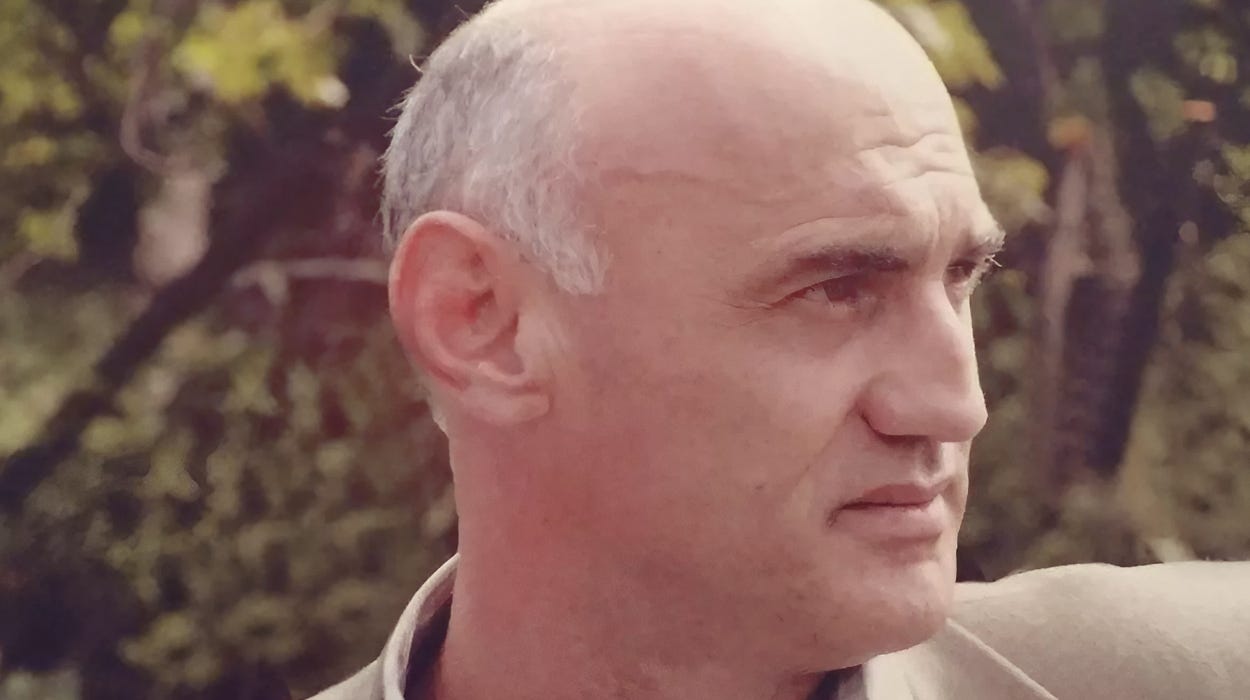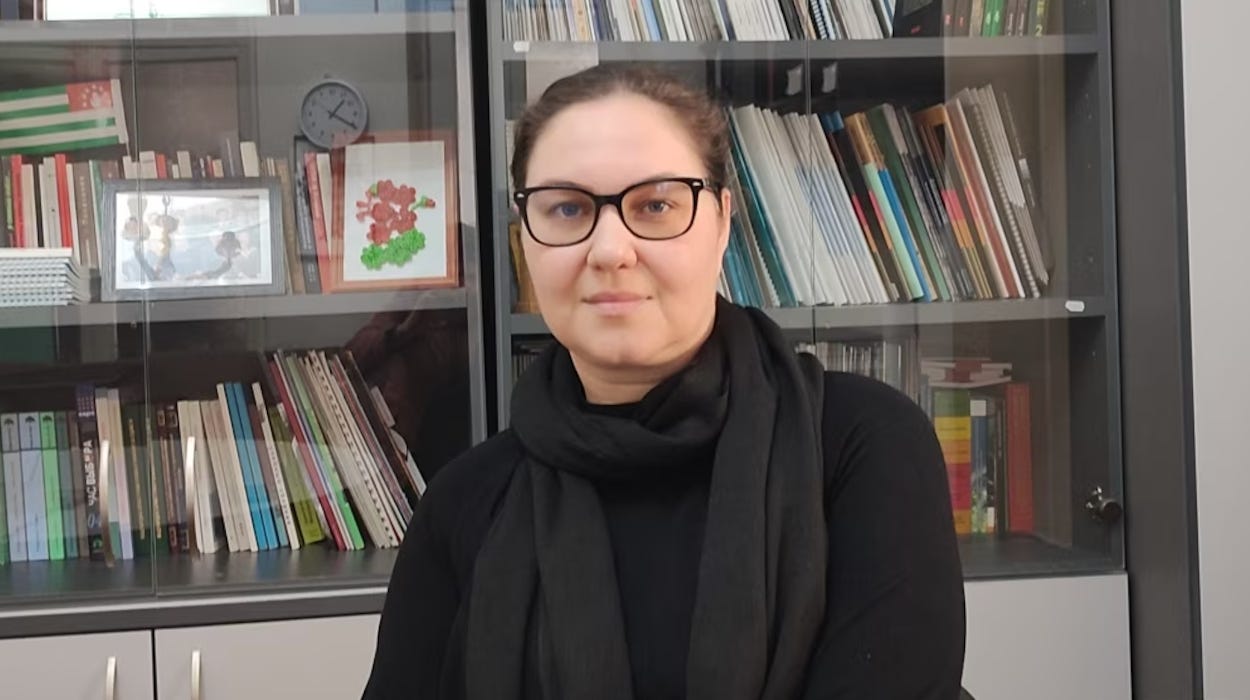Guram Gumba: "The Power Attempts to Destroy the Blood-Earned Freedom and Independence of Abkhazia"
"State Sovereignty is not only and not so much about symbols - the flag, emblem, constitution, borders, governing bodies, international recognition."
Historian and Politician, Guram Gumba critically addresses the threats to Abkhazia's independence and freedom in this article, first published on ApsnyHabar and translated from Russian. Highlighting the government's controversial actions, Gumba's analysis exposes the challenges facing Abkhazian society. Through meticulous critique, he explores the implications of current governmental policies on the country's sovereignty and the spirit of its people.
The time has come when it has become impossible to neglect the current situation: an increasing number of Abkhazia’s citizens—regardless of their beliefs and preferences, whether they support the government or not—begin to understand that they are losing their country. Many find it hard to believe in the reality of what is happening, so brazenly, disregarding public opinion, bold and cynically, the power tries to annihilate (it's hard to find another word) the blood-earned freedom and independence of Abkhazia.
We knew and know that attempts at the de-sovereignisation of Abkhazia come from Georgia with the support of the West, but the idea that such a policy would be initiated by our own elected highest leadership of Abkhazia was unthinkable. Yet, the facts are glaring: the violation of the Constitution of the Republic of Abkhazia by transferring sovereignty over a part of its territory to a foreign state; the apartment law project, whose adoption will inevitably lead to the mass settlement of Abkhazia by foreign citizens, putting the existence of the small Abkhaz nation at risk; the law project on "foreign agents," aimed against the true patriots—supporters of Abkhazia's independence, i.e., the bearers of the spirit of freedom. And the interdepartmental agreement project, according to which the internal troops of a foreign state—the Russian Federation can be involved in protecting public order, property of individuals and legal entities on the territory of the Republic of Abkhazia, is nothing but an attempt to declare war on its own people. It's unknown what other surprises our power is preparing for us tomorrow! [Interior Minister Robert Kiut stated that no agreement will be signed with the Russian National Guard. — Trans.]
All this happens against the background of a real threat of loss of identity, language, and cultural disintegration of the people as a result of aggressive imposition of foreign cultural and spiritual traditions in the country, attempts to squeeze the Abkhaz into some "cultural worlds." The power, with all its actions, tries not just to consign to oblivion but also to discredit the democratic traditions of the Abkhaz people, striving to replace them with alien surrogate traditions for the purpose of creating an authoritarian power, which, it turns out, also relies on the military structures of a foreign state.
As a result of behaviour completely uncharacteristic to the Abkhazian mentality and the policy conducted by the head of state, the reputational losses of Abkhaz statehood, both domestically and abroad, are enormous. With all the will in the world, one cannot find an analogue in world history when the elected head of an independent state publicly declares that the people who elected him as the guarantor of its preservation publicly announces to him that he can become a minority in his own homeland and there is nothing terrible in this!!!
And the attempt to instil in the people the notion of their worthlessness, incapability not only in building an independent state but also in providing themselves with the necessary basic conditions for life, is already beyond any bounds. Such an attitude towards the people is characteristic only of colonial power in conquered countries and in international legal practice is qualified as an expression of cultural racism. But in the history of states, there has not yet been an instance where a democratically elected leadership would instil in its own people the notion of their supposed incapability of independent and dignified life without guardianship and help from outside. This is nonsensical. Moreover, this is said to the Abkhaz people, a people with almost two thousand years of independent statehood, whose history is filled with heroism and self-sacrifice in the struggle for their freedom and independence, loyalty to themselves, their language, and their culture.
A paradoxical situation has arisen - the Abkhaz state needs to be saved from its own state elite, or rather, those who fancy themselves as such, having found themselves in power today. Today, our authorities not only deprive themselves of legitimacy but, most frighteningly, they inflict colossal damage on the idea of independent Abkhaz statehood, destroying its prestige.
Frankly, it sometimes starts to seem, as many have begun to voice, that power in Abkhazia has been seized by some transnational oligarchic group which, through puppet leadership they installed, attempts to create a corresponding legislative base with the aim of turning Abkhazia into their own property. And to keep its citizens in obedience and turn them into a subservient staff, they are forming a transnational military-police group.
"State Sovereignty is not only and not so much about symbols - the flag, emblem, constitution, borders, governing bodies, international recognition. Sovereignty is, first and foremost, about a sovereign personality, a sovereign citizen, and a sovereign ideology, based on faith in one's own strength and independent development."
Diana Kerselyan: "We Do Not Intend to Be Recognised as Enemies of the People"
Elena Zavodskaya — The bill "On Non-Commercial Organisations and Individuals Acting as Foreign Agents" has been submitted to the Parliament of Abkhazia and is expected to be considered shortly. Diana Kerselyan, a board member of the non-governmental organisation Centre for Humanitarian Programs and head of the public human rights office, discussed with 'Ekho Kavkaza' (Echo of the Caucasus) the potential societal impacts should this bill be enacted.
Elena Zavodskaya: In the Parliament, the bill regarding foreign agents is set for imminent review. At the same time, we are witnessing a significantly negative and widespread reaction in society against this law's adoption. What's prompting this reaction, and what concerns do people have?"
Diana Kerselyan: The initiative to adopt this law isn't a recent development but has been a matter of concern for many years, starting around 2013 or 2014. Throughout this period, individuals who grasp the potential repercussions of this law have attempted to engage with parliament deputies and government officials, advocating against its enactment. The scope of individuals who could be affected by this legislation is broader than many realise. While initially, discussions revolved around amendments to the law governing the activities of non-commercial organisations regarding foreign agents, we now face a standalone law targeting organisations and individuals as foreign agents. This proposal is arguably the most stringent attempt to regulate this sphere. I firmly believe this law is fundamentally unacceptable and must not be passed under any circumstances, as it contravenes constitutional norms and severely restricts people's civil and political rights.
It's crucial for everyone to understand that the discussion extends beyond those employed by non-governmental non-commercial organisations. It encompasses a far wider array of individuals, including political activists, journalists, and diaspora members, essentially, anyone who has had any interaction with international organisations. Launching such a repressive mechanism will only lead to increasingly strict measures over time. The fact that someone might not be affected by this law today doesn't guarantee they won't be encompassed by future amendments aimed at expanding the definition of foreign agents. It's evident to us that the motive behind this law isn't to regulate NGO activities or oversee international organisations' operations but rather to curb the freedom of expression, to limit the dissemination of views that diverge from those of the ruling party.
– Everyone is discussing the significant infringement on people's rights. Can you detail, according to this law, the specific restrictions that will be imposed on the citizens of Abkhazia who are affected by this legislation?"
– Indeed, the restrictions are extensive. Under this law, individuals and employees of organisations identified as foreign agents will be barred from engaging in teaching, participating in public debates, roundtables, and conferences, and from involvement in electoral campaigns. In essence, this will strip such individuals of a broad array of political and civil rights. Envisioning such constraints within a democratic society is virtually inconceivable. It fundamentally breaches the principles of our democratic framework, amounting to a form of segregation by isolating this group from the rest of society, which retains its full rights. Frankly, it's challenging to comprehend how such a model could be operational in a democratic state in the 21st century.
– Diana, in public discourse, it's evident that many do not grasp the full significance of this law or its repercussions. They suggest, somewhat dismissively, 'Just label us as foreign agents and carry on as before.' How would you counter that perspective?
– Indeed, this represents a significant misunderstanding. I need to emphasise that nearly everyone involved in the non-commercial sector or in civil organisations would find it untenable to function under such a designation. But the issue extends beyond merely being tagged as foreign agents due to receiving Western funding. The real concern lies not with the funding but with the extensive restrictions on rights that the law imposes.
– Diana, from your viewpoint, what necessitates this law? Why has there been such a relentless effort over the years to introduce it, now attempting to enact it in its most stringent form?
– It's apparent that the law's purpose isn't genuinely to regulate NGO activities or those of international organisations. That's merely a facade because existing legislation already provides for the regulation of non-commercial organisations, complete with effective oversight mechanisms. We fulfil our reporting obligations to the Ministry of Justice, including annual reports, applications for charitable status, and quarterly updates, besides undergoing independent international audits. Thus, portraying this law as a means of enhancing control is misleading and transparently so. The underlying intent is to establish a repressive tool aimed at suppressing dissent and the civic engagement of individuals critical of official policies. Some argue that NGOs should focus solely on social and charitable issues without 'interfering' in politics. However, as citizens, we are entitled under the Constitution and law to the same rights as everyone else, including the right to voice our opinions and advocate our positions through various means, whether in writing, at public demonstrations, etc. The real aim behind this law is to stifle us, to strip away our ability to express dissenting views.
SUPPORT ABKHAZWORLD
AbkhazWorld website is dedicated to generate an informational resource, especially for the benefit of non-Abkhazians who wish to learn more about the heritage, culture, and history of the Abkhazian people and their country, Abkhazia.
At AbkhazWorld, we depend on the generosity of individuals like you to support our work. Our resources are very limited, and there is still much more that we need to accomplish. Your donation can make a significant impact and help us continue our efforts to promote understanding and awareness of the Abkhazian people and their culture.
Make a donation today to support the work of AbkhazWorld and help us continue our projects.
You can support our work with a one-time donation or monthly subscription.
PayPal: https://www.paypal.com/donate/?hosted_button_id=KZMKPDZHLYVDA
(No need PayPal account)
Buy me a coffee: https://www.buymeacoffee.com/abkhazworld
Patreon: https://www.patreon.com/AbkhazWorld



